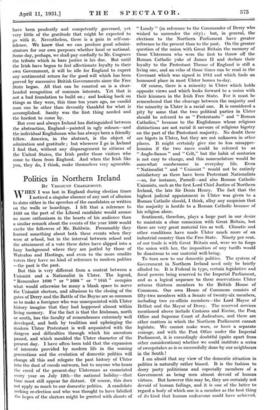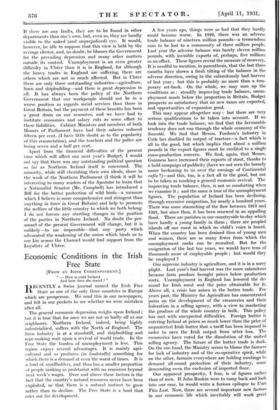Politics in Northern Ireland
BY VISCOUNT CHARLEMONT.
IVHEN I was last in England during election times I noticed a singular absence of any sort of allusion to dates either in the speeches of the candidates or written on the walls or hoardings. I felt that a reference to 1649 on the part of the Liberal candidate would arouse no more enthusiasm in the hearts of his audience than a similar remark about the events of the year 1660 would excite the followers of Mr. Baldwin. Presumably they learned something about both these events when they were at school, but in the interval between school and the attainment of a vote these dates have slipped into a hazy background where they are jostled by those of Waterloo and Hastings, and even to the more erudite voters they have no kind of reference to modern politics —the past is the past.
But this is very different from a contest between a Unionist and a Nationalist in Ulster. The legend, " Remember 1690 " or " 1688 " or " 1641 " occupies what would otherwise be many a blank space to nerve the Unionist electors, and allusions to the closing of the gates of Derry and the Battle of the Boyne are so common as to make a foreigner who was unacquainted with Ulster history imagine that they had happened almost within living memory. For the fact is that the Irishman, north or south, has the faculty of remembrance extremely well developed, and both by tradition and upbringing the Modern Ulster. Protestant is well acquainted with the dangers and difficulties through which his ancestors passed, and which moulded the Ulster character of the present day. I have often been told that the expansion of interests provided by modern life in the coming generations and the evolution of domestic politics will change all this and relegate the past history of Ulster into the dust of creeds outworn, but to anyone who hears the creed of the present-day Ulsterman as enunciated every year on July 12th—the national holiday—that time must still appear far distant. Of course, this does not apply so much to our domestic politics. A candidate seeking re-election and who was thought to have falsified the hopes of the electors might be greeted with shouts of " Lundy " (in reference to the Commander of Derry who wished to surrender the city) ; but, in general, the elections to the Northern Parliament have greater reference to the present than to the past. On the greater question of the union with Great Britain the memory of those Ulstermen who were the first to throw off the Roman Catholic yoke of James II and declare their loyalty to the Protestant Throne of England is still a living one, and an echo of those times can be read in the Covenant which was signed in 1912 and which finds an honoured place in most Ulster homes to-day.
Of course, there is a minority in Ulster which holds opposite views and which looks forward to a union with their kinsmen in the Irish Free State. For it must be remembered that the cleavage between the majority and the minority in Ulster is a racial one. It is considered a pity by some that the two political parties in Ulster should be referred to as " Protestants " and " Roman Catholics," because to the Englishman whose religious distinctions are not racial it savours of religious bigotry on the part of the Protestant majority. No doubt there are bigots in Ulster, but they are not unknown in other places. It might certainly give rise to less misappre- hension if the two races could be referred to as " Anglo-Saxon " and " Celt," but the habit of centuries is not easy to change, and this nomenclature would be somewhat cumbersome in everyday life. Even " Nationalist " and " Unionist " would not be entirely satisfactory as there have been Protestant Nationalists —as, for instance, Parnell—and also Roman Catholic Unionists, such as the first Lord Chief Justice of Northern Ireland, the late Sir Denis Henry. The fact that the highest judicial appointment in Ulster was given to a Roman Catholic should, I think, allay any suspicion that the majority is hostile to a Roman Catholic because of his religion alone.
Sentiment, therefore, plays a large part in our desire to maintain a close connexion with Great Britain, but there are very great material ties as well. Climatic and other conditions have made Ulster much more of an industrial country than the Free State. Ninety per cent. of our trade is with Great Britain and, were we to forgo the union with her, the imposition of any tariffs would be disastrous to our material well-being.
To turn now to our domestic politics. The system of Government in Northern Ireland need only be briefly alluded to. It is Federal in type, certain legislative and fiscal powers being reserved to the Imperial Parliament, and as a logical sequence to these reservations Ulster returns thirteen members to the British House of Commons. Our own House of Commons consists of fifty-two members with a Senate of twenty-six members, including two ex-officio members—the Lord Mayor of Belfast and the Mayor of Derry. The reserved services mentioned above include Customs and Excise, the Post Office and Supreme Court of Judicature, and there are other matters in which the Northern Parliament cannot legislate. We cannot make wars, or have a separate coinage, and with the Post Office under the Imperial Parliament, it is exceedingly doubtful (quite apart from other considerations) whether we could institute a series of sweepstakes as is so successfully done by our neighbours in the South !
I am afraid that my view of the domestic situation in politics is naturally rather biased. It is the fashion to decry party politicians and especially members of a Government as being men almost devoid of human virtues. But however this may be, they are certainly not devoid of human failings, and it is one of the latter to regard a body of which one is a member as the best thing of its kind that human endeavour could have achieved. If there there are any faults, they are to be found in other departments than one's own, but, even so, they are hardly visible to the naked (and unprejudiced) eye. It would, however, be idle to suppose that this view is held by the average elector, and, no doubt, he blames the Government for the prevailing depression and many other matters outside its control. Unemployment is an even greater difficulty in Ulster than it is in England, for although the heavy trades in England are suffering, there are others which are not so much affected. But in Ulster there are only three outstanding industries—agriculture, linen and shipbuilding—and there is great depression in all. It has always been the policy of the Northern Government that our workpeople should not be in a worse position as regards social services than those in Great Britain, but the payment of these benefits has been a great drain on our resources, and we have had to institute economies and salary cuts as some offset to these liabilities. Cabinet Ministers and members of both Houses of Parliament have had their salaries reduced fifteen per cent. (I have little doubt as to the popularity of this renunciation), and the teachers and the police are losing seven and a half per cent.
Apart from the financial difficulties of the present time which will affect our next year's Budget, I would not say that there was any outstanding political question so far as Northern Ireland itself is concerned. The minority, while still cherishing their own ideals, share in the work of the Northern Parliament (I think it will be interesting to many readers of the Spectator to learn that a Nationalist Senator (Mr. Campbell) has introduced a Bill for the better protection of wild birds—a measure which I believe is more comprehensive and stringent than anything in force in Great Britain) and help to promote the welfare of the little country to which we both belong. I do not foresee any startling changes in the position of the parties in Northern Ireland. No doubt the per- sonnel of the present Government will change, but it is unlikely—to me impossible—that any party which advocated the weakening of the union which binds us to our kin across the Channel would find support from the Loyalists of Ulster.











































 Previous page
Previous page